The Partnership for the 21CSC would like to recognize the following finalists for the 2019
21st Century Conservation Service Corps Champion of the Year Award.
We sincerely appreciate all that you do to champion the engagement of young adults
and veterans on public lands.
Learn more about the Award
The winners of the 2019 Champion of the Year Award will be recognized in February in Washington, DC at the annual meeting of the Partnership for the 21CSC (P-21CSC). This meeting is part of The Corps Network National Conference.
Paul Gritten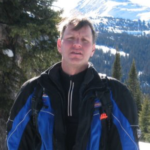
Wyoming State Parks
“Paul has served his country in the military, and now serves his community in a very positive and calculable way. His effort shows in the trails the public uses, and in the faces of every Corpsmember he has the pleasure of working with.”
A military veteran, Paul Gritten now serves as the Non-Motorized Trails Program Coordinator for Wyoming State Parks. In this role, he has been an integral partner for the Wyoming Conservation Corps (WCC) over the past decade. Paul helps coordinate comprehensive trainings in trail construction techniques for WCC participants, and has gone above and beyond to find project opportunities for the Corps.
Paul’s leadership abilities have been noticed by everyone who serves in WCC’s program. Paul strives to have individual, meaningful connections with each and every Corpsmember. In addition to his connection with the WCC, Paul has also been a key player in the formation of the Wyoming Veterans Trail Crew (WyVTC). This program is run by the WCC for military veterans across the state. Paul’s leadership and council helped lift the program off the ground in 2017.
Paul is a dedicated steward of the land who strives to give Wyoming access to sustainable, usable, and inclusive trails. He takes it upon himself to understand the type of users that are using his parks and builds trail systems accordingly. In addition to his inclusive mentality, he is passionate about passing this style of trail building on to anyone he can.
Carlos S. Lovato III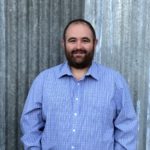
USDA Forest Service
Santa Fe National Forest, Pecos/Las Vegas Ranger District
“If every district has a Carlos, there would be many more youth conservation programs and opportunities across the nation.”
For the past 18 years, Carlos S. Lovato III has been a dedicated employee of the Pecos/Las Vegas Ranger District on the Santa Fe National Forest in New Mexico. His work focuses on natural resource management, primarily managing watershed and soils for the District, but he maintains an important role overseeing range and forestry resources across an area that includes short-grass prairie, pinon-juniper woodlands, ponderosa pine forests, mixed conifer forests, and sub-alpine and alpine ecosystems. The district also contains a wilderness area, several large burn scars, and the municipal drinking water watershed for the town of Las Vegas.
For the past 16 years, Carlos has served as a liaison to the Forest Stewards Youth Corps – a program of Forest Stewards Guild (a 21CSC Member Organization). He has helped hire each Corpsmember, assisted in project development, and provided administrative support. Even as staffing has fluctuated, Carlos has diligently worked year-round on the agency side to ensure the success of this nine-week program. In addition to working with 21CSC Corpsmembers, Carlos has partnered with numerous organizations to engage more youth and volunteers at the forest, and uses his spare time to coach youth sports and support local 4-H activities.
Lisa Norby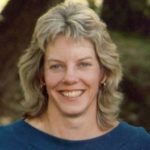
National Park Service
Geologic Resources Division, Mosaics in Science and Geoscientists-in-the-Parks Program
“Lisa should be recognized as a national leader in engaging the next generation of conservationists on public lands because of her hard work, dedication, and lifelong passion for youth programming.”
For 26 years, Lisa’s career with the National Park Service has spanned many different programs and projects including park planning, petroleum geology, and overseeing youth programs. In her current role with the Geologic Resources Division, Lisa oversees two large-scale internship programs. For the last 13 years, she has managed the largest NPS natural resource science internship program, Geoscientists-in-the-Parks (GIP). The GIP Program is managed in partnership with 21CSC organizations Conservation Legacy, Stewards Individual Placement Program, and The Geological Society of America. The GIP program provides internship opportunities to approximately 170 young adults in national parks each year, providing technical assistance to parks to complete critical natural resource science projects. In 2013, Lisa also helped create the Mosaics in Science Program, which, in partnership with Environment for the Americas and Greening Youth Foundation, provides meaningful, science-based internships to racially and ethnically diverse young adults.
Lisa has been a dedicated and enthusiastic advocate for youth programming for decades, and the partnerships developed through her creativity and efforts have provided priceless experiences for young adults and helped preserve public lands. Lisa recognizes the benefits of involving future generations in conserving public lands and seeks out opportunities to increase the visibility of environmentalism and youth programming.
Greg Sanders
USDA Forest Service
Veterans and Job Corps Fire Programs
“[Greg’s work] convening Corps and USFS leadership has helped the programs succeed, develop, continually improve, and has been instrumental in the placement of veterans in jobs with the USFS.”
Greg Sanders started his career in wildland fire working on an engine crew on the Malheur National Forest in Oregon where he worked for seven fire seasons. Since then, he has dedicated his career to forest fire management. He has been integral to the development and implementation of the Veteran Fire Corps programming operated nationwide by a variety of 21CSC member organizations including Conservation Legacy, California Conservation Corps, Student Conservation Association, Mt. Adams Institute and Montana Conservation Corps. With Greg’s support, the Veterans Fire Corps program expanded across the country and has continued to develop and grow in depth and breadth.
Greg champions and leads the efforts nationwide to engage veterans in fire programs and has worked to increase opportunities for alumni from these programs to successfully obtain jobs in wildland fire. He has convened federal and Corps partners to discuss best practices and opportunities for collaboration. Additionally, Greg developed a system to collect critical program data from across the country that demonstrates the success and impact of Veterans Fire Corps programs. His commitment to ensuring that all veterans who are interested in a job in wildland fire post-program is explicit and his investment has benefited veterans across the country.
Paul Smith
USDA Forest Service
Ochoco and Deschutes National Forests, Crooked River National Grasslands
“Paul consistently goes above and beyond, building and maintaining his certification and skills to take programs to the next level, encouraging new crew leaders and filling gaps – whenever and wherever they appear- so that Central Oregon can serve as many youth as possible in these programs and help build bridges to the next steps in their lives.”
After serving as a member of the Peace Corps in Gambia, West Africa for 2 years, Paul continued working in the field of forestry and restoration before joining the Forest Service 15 years ago. Paul coordinates the work of the Central Oregon Youth Conservation Corps. Working in coordination with 21CSC partners Heart of Oregon Corps and Central Oregon Intergovernmental Council, Paul oversees projects that annually engage over 100 youth from four counties, with an emphasis on underserved populations. Paul also coordinates with both groups’ year-round Conservation Corps, serving an additional 100 youth annually. Paul has also partnered with such 21CSC organizations as Northwest Youth Corps, Mt. Adams Institute, and Discover Your Forest. He also facilitates, and builds partnership programs with a variety of other youth-serving organizations, including community justice programs and local schools.
Through projects as diverse as native seed collection and fence building, to heritage site surveys and riparian rehabilitation, Paul ensures that Corpsmembers experience a range of natural resource career paths, build concrete skills, and learn about themselves as they build relationships with mentors and peers. Paul’s efficiency and collaborative efforts have led to practical “next steps” for youth in the programs he oversees. For example, he coordinates job shadows and has led successful “Career Days” that connect youth with over a dozen different private companies and federal agencies to complete hands-on job training activities. Paul’s commitment to serving youth and creating high-quality educational experiences is apparent in everything he does.
Tate Thriffiley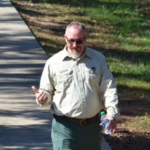
USDA Forest Service
De Soto National Forest, De Soto Ranger District
“What makes Tate an incredible project partner is that he is equally passionate about the development of young people as he is about educating and inspiring the community around environmental and conservation stewardship.”
For the past 16 years, Tate Thriffiley has served in a diverse array of positions at De Soto National Forest, working in all aspects of rare, sensitive, threatened, and endangered plants. Recently, he has served as a primary contact for GulfCorps programs, particularly partnering with Community Training Works and CLIMB CDC Conservation Corps on numerous projects.
Tate understands what it means to nurture young adults and has consistently displayed patience, creativity, and caring. He also understands the importance of providing Corpsmembers with comprehensive training and certifications. He has brought in trainers to provide all Year-2 GulfCorps members with S-212 Sawyer A-level certification. Some Corpsmembers also received training in prescribed fire. These efforts have allowed the Corps to have a much larger impact than initially anticipated. Corpsmembers have participated in a range of projects, including felling trees, conducting prescribed burns, and mapping and monitoring habitats as part of a multi-year project to restore Pale-topped Pitcher Plant bogs at De Soto. Tate’s impact stretches across all five Gulf states, where over 55 projects are being undertaken by the 10 GulfCorps crews.
Dennis Vásquez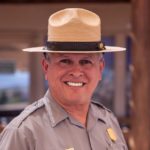
National Park Service
Petroglyph National Monument
“Dennis goes above and beyond to ensure that participants have a positive and lasting experience and make a life-long connection to public lands.”
Dennis Vásquez has worked for the National Park Service in a variety of capacities, including serving as Superintendent of four national park sites: Guadalupe Mountains National Park, Brown v. Board of Education National Historic Site, Bandelier National Monument and White Sands National Monument, and as Trustee of the Valles Caldera National Preserve. In addition, Dennis served as the Program Manager for the National Museum of the American Latino Commission from 2009 – 2011, guiding the Commission members in preparing and delivering a report to Congress and the White House on the potential creation of a national museum in Washington, DC. Over the years, he has served in leadership roles on boards, committees and work groups throughout the country. Since 1992, he has served in a number of consultative roles assisting protected area managers in Latin America. Vásquez is a native of El Paso, TX.
Dennis is an advocate for engaging communities who have traditionally not had as many opportunities to connect with our national parks. He helped foster partnerships and develop Southwest Conservation Corps’ Ancestral Lands program, which gives Native American youth the chance to explore their cultures through service. He also worked with Rocky Mountain Youth Corps – New Mexico to launch their Middle Rio Grande Urban Conservation Corps program. In addition, Dennis worked with RMYC to provide opportunities for the Corps’ American Sign Language Inclusion Crew. Dennis also served as facilitator for two sessions of the Student Conservation Association NPS Academy conducted at Grand Teton National Park.
Many individuals have transitioned from these Corps programs to employment in conservation positions. Dennis strives to serve as a mentor to young people in all these programs and encourages NPS staff and other program leaders to embrace this mentorship role.
Jennifer Wheeler
Bureau of Land Management
Arcata Field Office
“It is rare that one person helps provide so much for so many. The education and opportunity for such a diverse set of young adults only happens when someone thinks more about others than themselves.”
Jennifer Wheeler has worked with the California Conservation Corps (CCC) for over two decades, facilitating life-changing service experiences for rural and urban youth from almost every social and economic demographic within the state of California. She is a champion of Corpsmembers, helping thousands of CCC participants learn about science, nature, strong work ethic, how to communicate properly, how to push yourself through adversity, and most of all, how to be a better citizen and custodian of Mother Earth.
For years, Jennifer has been mentoring CCC members, as well as college graduates through BLM’s cooperative agreement with the Chicago Botanic Garden Conservation Land Management (CLM) internship program. She has provided training and practical experience in the fields of botany, range management, as well as land-use planning, NEPA and ESA regulatory compliance, GIS, and GPS.
Notably, Jennifer has worked with the CCC since 1994 on the recovery of coastal dunes and grasslands that provide important habitat for endemic plants, pollinators, and shorebirds. Over the years, these restoration efforts have engaged more than 10,000 CCC members and volunteers. Thanks to these efforts, a 2012 status review recommended the down-listing of the beach laiya – a coastal flowering plant – from endangered to threatened. She also worked with CCC members and other partners on eradicating over two dozen non-native species on over 200,000 acres of public land in northwestern California using manual regimes instead of herbicides. Jennifer is dedicated to providing meaningful, diverse experiences.
Craig Young
National Park Service
Heartland Inventory and Monitoring Network
“He has a passion for and recognizes the importance of providing training, education, and experience for the next generation of conservationists and natural resource managers.”
Craig Young is a strong advocate and voice for Conservation Corps and national service in the Midwest. He is a valuable project partner, host, and mentor for many young people interested in entering the natural resource field. Over the years, Craig has provided direct service opportunities and mentorship to nearly 200 AmeriCorps members. His dedication to conservation and training young people has led to a long-term partnership that has greatly enhanced Conservation Corps Minnesota and Iowa (CCMI)’s programs and work throughout the Midwest.
Craig’s leadership and guidance, grew from a few habitat restoration projects each year to a much larger partnership between CCMI and the NPS-Heartland Network. Craig and his staff take part in CCMI’s training and orientation to provide expert teaching to over 36 AmeriCorps members each year in topics ranging from GIS/GPS data collection, chemical application best practices and invasive species management. Craig and his staff also lead a discussion with members on how to pursue employment with federal resource agencies, offering career advice and guidance in résumé writing and USAJobs applications.
Craig has specifically chosen to use his limited program funds to partner with Conservation Corps Minnesota and Iowa and has persuaded the individual parks within the Heartland Network to do so as well.
Jim Ziolkowski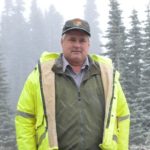
National Park Service
Mount Rainier National Park
“Jim’s normally quiet, low key demeanor melts away as he talks passionately about the importance of service, the value of hard work well done, and the impact that working on public land has on the larger community. He works out of the spotlight, but by his own example is inspiring a generation of NPS professionals and now thousands of youth who have the amazing opportunity to work on his team.”
Jim Ziolkowski’s career in public lands management started in college when he served as a summer intern with the Student Conservation Association (SCA) at Mount Rainier National Park. Through that experience, Jim realized he wanted to work for the National Park Service (NPS). Since then, Jim has worked with, supported, developed funding for, and nurtured many Corps programs at Mount Rainier, including SCA, EarthCorps, Washington Conservation Corps, and Northwest Youth Corps. In his role as Trails and Roads Foreman, he has been a tireless advocate and mentor for Corpsmembers at Mount Rainier, providing advice, guidance, and hands-on work experience to Corpsmembers from throughout the region, across the country, and from diverse life experiences. He is committed to supporting initiatives led by partner Corps, such as Northwest Youth Corps, to engage young people from underrepresented groups in the outdoors, including those from the Deaf and Hard of Hearing community and from the LGBTQ+ community.
Thanks to Jim, the trails program at Mount Rainier is extraordinarily welcoming of youth conservation service partnerships. Jim regularly prioritizes Corps in the park’s roads and trails budget, making sure trail projects can serve two purposes: getting important work done to ensure the resources of the park are protected and available to the public, and investing in the next generation of park stewards.
 Q and A with Lisa Norby: 2019 Champion of the Year
Q and A with Lisa Norby: 2019 Champion of the Year

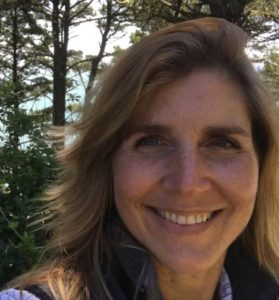
 Terrestrial Program Leader
Terrestrial Program Leader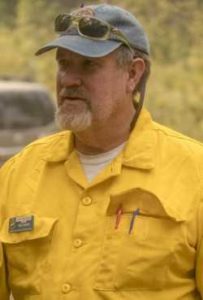 Greg Sanders
Greg Sanders








